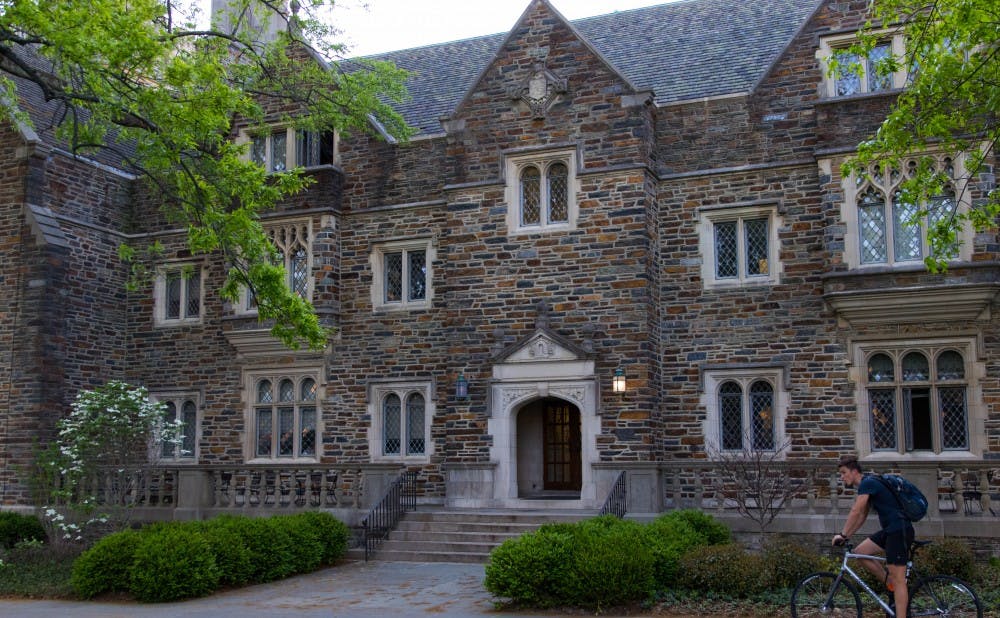Thinking about adding on that second major? Make sure you still have enough time to fulfill your foreign language requirement.
Students in Trinity College of Arts & Sciences have mixed feelings about their foreign language policy, which requires them to take three courses or reach a 300-level class in a given language, whichever comes first. International and native students are not exempt from this requirement.
While some of Duke’s peer institutions like University of North Carolina-Chapel Hill, Emory University and Harvard University require students to take a language course, some allow students to test out of the requirement or use high school credits to fulfill it.
The language policy at Duke serves various purposes, according to Trinity’s website. These include “global understanding,” “professional success” and “personal growth.”
Liliana Paredes, professor of the practice of romance studies, hopes that students understand that “learning a language will broaden the way they perceive the world.” However, Paredes notes that there are some flaws with the implementation of the policy itself, including that some students wait until the last minute to fulfill the language requirement.
“It is our responsibility as faculty to encourage them to start as soon as possible and make them understand that the language requirement is not a chore,” Paredes said. “It’s put there to give the student the opportunity to think beyond English.”
Senior Sam Freder, who is pursuing a minor in French, thinks that the language requirement is a good idea.
“I think that going into any sort of professional life without some sort of foreign language knowledge is detrimental, and I think it opens up a lot of doors for you,” Freder said. “The emphasis here on pursuing French in specific domains of life has helped me improve my ability to speak about more academic topics that I never really had before coming here.”
For other students who aren’t looking to speak another language fluently in their daily life, the language requirement can feel like a waste of time. Senior Madeleine Scully feels that learning languages is a good idea for the development of students but noted that she doesn’t end up prioritizing it compared to her other, more difficult coursework.
“It’s really great to make people learn other languages,” Scully said. “However, I also had other harder classes, so I didn’t put in the time for it. So now, I forgot all the Spanish I learned because I’m not continuing to work on it.”
First-year Grace Kurtz-Nelson said that her positive outlook on the foreign language requirement came from her experience learning French from an early age. She’s also had a pen pal since age 13 and participated in some exchange programs.
“It's been super enriching for me, and it's just taught me so much about the world,” she said. “So I think that having a foreign language requirement can encourage those types of things.”
Kutz-Nelson also acknowledged how the foreign language requirement at Duke could be a burden on those who may not have had the opportunity to learn a language in high school.
“I also think that the language requirement could be biased towards upper-income individuals who went to the high schools that might have more resources and might have taught more languages,” Kurtz-Nelson said.
First-year Chioma Ibeku likes the depth of study required by the policy and plans to study a language. However, Ibeku noted that the types of languages offered at Duke represent a Eurocentric bias, citing that the only African language offered is Swahili.
In the future, Ibeku plans to work in Africa and feels that it is important to learn the native language of the community in which she plans to live.
“You don’t need to know the lingua franca of some European colonizer country like English or French or Spanish,” Ibeku said. “Those three languages were all brought by colonization.”
Paredes believes that the only way to fix these problems is by “having an open conversation about student’s expectations and experiences within the foreign language department.”
“How the foreign language requirement is going to shape up depends on all of us,” Paredes said. “The bottom line of the language requirement is to be more inclusive, and it’s important to hear the students’ voices.”
Get The Chronicle straight to your inbox
Signup for our weekly newsletter. Cancel at any time.

Adway S. Wadekar is a Trinity junior and former news editor of The Chronicle's 119th volume.

